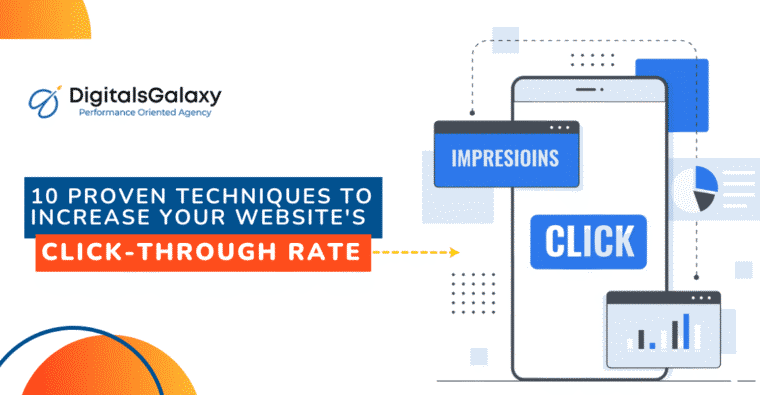As a website owner, your main goal is to get more visitors to increase your conversion rate. One of the most effective ways to reach this goal is to increase the number of clicks on your website. Click-through rate (CTR) is one of the most critical metrics in digital marketing because it shows how successful your efforts are in getting consumers to engage with your content. It shows the proportion of users who clicked on a given link or call-to-action (CTA) on your website out of the total audience who viewed it. A high CTR indicates that your website is engaging and that people find your content interesting. Likewise, a low CTR may indicate that your audience is not finding what they are searching for or that your marketing messages are not resonating.
What is the organic click-through rate (CTR)?
Organic Click Through Rate is the proportion of users who click a link in the search engine results. Search engine algorithms use organic CTR to determine how well your website performs in search results. Pages with a greater click-through rate appear higher in search engine rankings.
The click-through rate (CTR) is one aspect that influences the popularity and ranking of a website. Your social media activity can bring down an entire business, even if you are unaware. If you don’t know much about search engine optimization, it can be hard to understand the terms used to talk about organic click-through rates. Every time you conduct a web browser search, you engage in search engine optimization. If you are looking for information about a specific skin care product, clicking on the search results will show you essential information for businesses, websites, and the browser itself.
This blog post will examine ten proven ways to increase your CTR and will assist you in optimizing the click-through rate of your website.
1. Optimize your Meta Titles and Descriptions
Your Meta title and description are the first things that users see when they search for your website on search engines like Google. A well-written meta title and description can significantly boost your website’s click-through rate (CTR). A captivating meta title that draws the user’s attention is crucial for driving clicks. Ensure your meta title is concise, accurate, and includes primary keywords. Your meta description should be a summary of what your website is about, and it should be written in a way that entices users to click on your link.
2. Use compelling headlines
Your website’s headlines are also crucial for increasing your click-through rate. A compelling headline should be attention-grabbing, informative, and relevant to your target audience. Your headline should also include your primary keyword, which will help it rank higher on search engines. Use numbers, questions, and emotional triggers to make your headlines stand out.
Use strong words and emotional triggers that make people feel something to make your headlines interesting. For instance, you might replace “10 Suggestions for Better Sleep” with “Learn the Secret to a Good Night’s Sleep with These 10 Proven Tips.” You can also employ intriguing statements that make the reader desire to learn more. For instance, “How to Save Money on Groceries” can be rewritten as “Learn the Surprising Techniques That Can Save You Hundreds of Groceries.”
3. Include Strong CTAs
Your website’s call-to-action (CTA) is the button or link that encourages users to take a specific action, such as “buy now” or “sign up for our newsletter.” A strong CTA should be clear, concise, and visually appealing. It should also be placed in a prominent location on your website, such as at the top of the page or in the center of your content. Use action-oriented language, such as “get started” or “claim your discount,” to make your CTA more compelling.
4. Use Relevant Content
Google strives to deliver the most relevant information to its users, taking into account past search experiences and current keyword queries. To get a high ranking on Google, you must ensure that your content is relevant to the keywords you want to rank for and easy to find. If your content effectively addresses users’ needs and concerns, they will be more likely to engage and click through. Make your content as relevant as possible by using keywords and phrases that match the searcher’s intent and answer their question or solve their problem.
5. Use A/B Testing
A/B testing is a technique that involves creating two versions of a web page and testing them to see which version performs better. This is an excellent way to determine which headlines, Calls To Action (CTAs), and page layouts work best for your target audience. Experiment with different colors, fonts, and designs to see which ones generate the highest click-through rates and are most effective in driving engagement and clicks.
6. Use Descriptive URLs
People often forget to include a descriptive URL when improving their CTR. Even though there is no exact formula for figuring out the click-through rate, it is important to know that easy-to-understand URLs get more clicks. Individuals are more likely to click on URLs with more description and explanation. If it’s merely a collection of numbers and words next to each other, you’re less likely to desire to learn more about that website. When you build new pages, optimizing the slug helps add more descriptive information to the URL. Always consider how you may make your website more SEO-friendly.
7. Make your page faster and more mobile-friendly
Page speed is a critical factor that affects your website’s click-through rate. Users expect websites to load quickly; if your site takes too long, they will likely click away. To improve your page speed, optimize your images, use a content delivery network (CDN), and reduce the number of HTTP requests on your site.
More than half of all website traffic comes from mobile devices, so ensuring your website is mobile-friendly is essential. A mobile-friendly website should be easy to navigate, with large buttons and easy-to-read fonts on a small screen. Use responsive design to ensure your website looks great on all devices, including smartphones and tablets.
8. Use Images and Videos
Images and videos can make your website more engaging and increase your click-through rate. Use high-quality images relevant to your content, including videos that provide valuable information or tell a story. Use captions and alt tags to describe your images and videos, which will help them rank higher on search engines.
9. Use Social Proof
Social proof and user reviews are potent ways to get your target audience to trust and believe in you. Social proof is a powerful technique to increase your website’s click-through rate. The social proof involves using testimonials, reviews, user-generated content, and ratings in your ads. You can show potential customers that others have had a positive experience with your products or services. Use social proof elements like social share buttons, customer reviews, and endorsements from trusted sources to help visitors feel more confident about clicking through to your site. It can significantly increase your CTR, as users are likelier to click on an ad if they see that others have had a good experience with your business.
10. Solve Keyword Cannibalization
Keyword cannibalization may sound like a scary concept, but it is common for people to be unaware that they have this problem. Keyword cannibalization refers to landing pages optimized for the exact keywords, spreading organic clicks. You may consider differentiating or consolidating the keywords you are trying to rank. This way, your click-through rate can be dedicated to only one page rather than 10 pages on your website.
Keywords are essential for any website, but knowing how to use them is equally important. They should not flood the page, take up the majority of words used, or be reasonably noticeable to the customer. With keywords, it is best to find related terms that can be used to replace them. This way, search engine optimization is made more efficient, and your click-through rate can be far more consolidated than before.
By taking these steps, you can help ensure that your website’s content is optimized for search engines and that users can easily find the information they are looking for, leading to increased click-through rates and, ultimately, more conversions. If you want more information to boost your click rate, visit our website and click the CTA button to speak to our representative.








